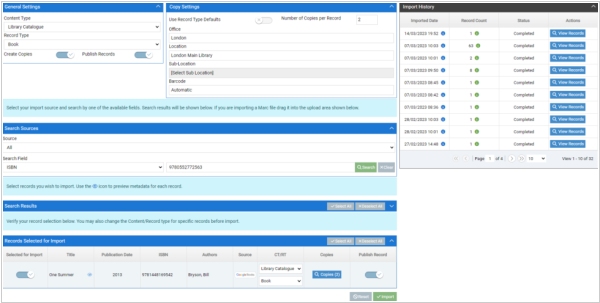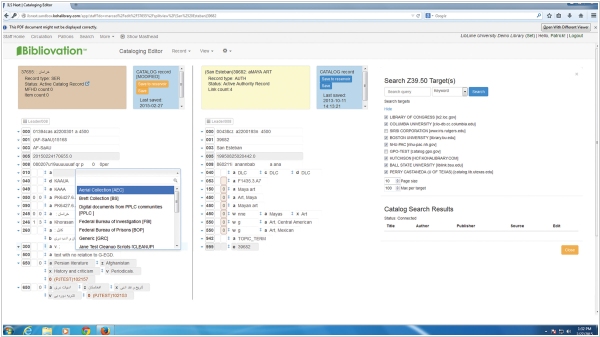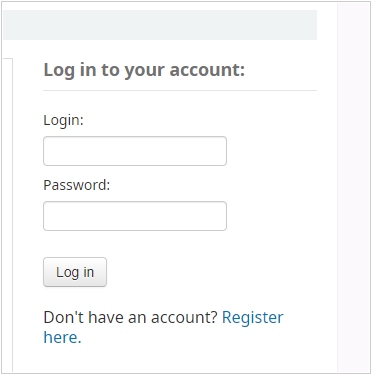Top 10: ILS software
July 30, 2023 | Author: Maria Lin
Integrated Library System (ILS) software, also known as Library Management System (LMS), is a comprehensive and essential tool for libraries of all sizes. This sophisticated software streamlines and automates various library operations, including cataloging, circulation, acquisitions, and patron management. With its user-friendly interface, librarians can efficiently manage collections, add new materials, and track borrowing activities. ILS software enables patrons to access the library's catalog, place holds, and manage their accounts online, promoting a seamless and convenient user experience. Advanced reporting and analytics features provide valuable insights into library usage, enabling administrators to make data-driven decisions to optimize their collections and services. Moreover, ILS software often integrates with other library technologies, such as self-checkout systems and online databases, to enhance the overall efficiency and functionality of the library. In today's digital age, ILS software remains an indispensable asset, empowering libraries to evolve and adapt to the changing needs of their communities while efficiently managing their valuable resources.
Some of the most popular ILS software are listed below.
See also: Top 10 Library Management Software
Some of the most popular ILS software are listed below.
See also: Top 10 Library Management Software
2023. Soutron ILS gets Auto Catalogue Import module

Soutron Library Management System 4.1.9 has been released, offering numerous enhancements, new features, security updates, and general improvements. This update prioritizes multi-device responsiveness across the Search Portal templates, ensuring a seamless experience regardless of the device used. The migration of bibliographic record importing to the new admin application brings along new functionalities like automatic copy creation and import history. In the revamped catalogue edit screen, the Orders Tab provides visibility into current and completed orders for the selected title. Additionally, users now have the flexibility to set the default search results template based on the device being used, enabling optimized and clearer search results for desktop, mobile, or tablet users. Moreover, the integration with Google Drive allows for the presentation of image collections directly within Soutron's records, utilizing the new Media Player plug-in within the Search Portal.
2023. Bibliovation 7.2 gets online payment options

LibLime introduces the latest version of its ILS software Bibliovation 7.2. It is entirely web-based, granting researchers, library staff, and system administrators access through web browsers. By leveraging the FedRAMP authorized IaaS and PaaS certification from Amazon AWS Cloud, along with a special security authorization from the US Department of Defense's cybersecurity experts for SaaS, Bibliovation provides libraries with a highly secure and cost-effective hosting solution. It supports various standards such as MARC21, Dublin Core, RDA, and geotagging, enabling libraries to manage both physical and digital content on a single Rest API-based platform. The Bibliovation circulation subsystem is purpose-built to facilitate shared union catalog solutions, granting individual consortium members significant autonomy, including ownership of local bibliographic records, item records, and patron records. Bibliovation MARC cataloging allows for local control over cataloging rules that can complement or surpass AACR2 and RDA rulesets. The acquisitions subsystem in Bibliovation is EDI-compliant, featuring a multi-tiered fund hierarchy and supporting the import of csv data converted into the MARC21 format for streamlined acquisition workflows. Additionally, Bibliovation now includes online payment options and comprehensive NCIP support. With hosted production, reporting, and test systems, libraries have the necessary capabilities and control to effectively support their daily operations.
2022. Follett School Solutions to acquire ILS software Accessit

Follett School Solutions, the top provider of K-12 educational technology solutions, has officially announced its acquisition of Access-It Software Ltd (Accessit), a renowned global provider of library management systems with a customer base of over 4,000 across 45 countries. This merger unites two highly comprehensive and forward-thinking solutions in the field of school library automation. Follett Destiny Library Manager has long been the preferred choice for school districts in North America, establishing itself as a leading solution. By joining forces with Accessit Library, a global leader in the market, the combined business offers a more comprehensive package, enabling the delivery of new capabilities to customers worldwide and better addressing the evolving needs of school libraries. This collaboration between a North American solution leader and an international leader presents an exciting opportunity for innovation that will provide educators around the world with the necessary support to overcome their daily challenges.
2022. Koha adds Electronic resource management

The new version of open-source library management software Koha has added Electronic resource management (ERM) module. This new module adds a mechanism to track the selection, acquisition, licensing, access, maintenance, usage, evaluation, retention, and de-selection of a library’s electronic information resources. These resources include, but are not limited to, electronic journals, electronic books, streaming media, databases, datasets, CD-ROMs, and computer software. Also the new version adds option to require 2FA setup on first staff login, allows storing item values as a template for creating new items, adds ability to create bundles of items for circulation, adds the ability to create ‘saved searches’ for use as filters when searching the catalog.
2022. Koha enables two-factor authentication

The new version of ILS system Koha 22.05 introduces an optional initial implementation of two-factor authentication (2FA) to enhance security during staff interface logins. This new feature incorporates time-based, one-time passwords (TOTP) as the second authentication factor. Librarians can utilize a dedicated application to manage the TOTP and obtain the necessary code for logging in. To enable 2FA for their account, librarians can navigate to More > Manage Two-Factor Authentication. The setup process involves the following steps: 1) Scan the QR code using an authenticator app. 2) Enter the generated one-time code. Subsequent logins will prompt librarians to enter the authenticator code after providing their regular login credentials. Any authenticator app, such as Google Authenticator, andOTP, and various others, can be utilized for this purpose. It is recommended to use applications that offer backup options for 2FA accounts, either through cloud-based or automatic methods.

